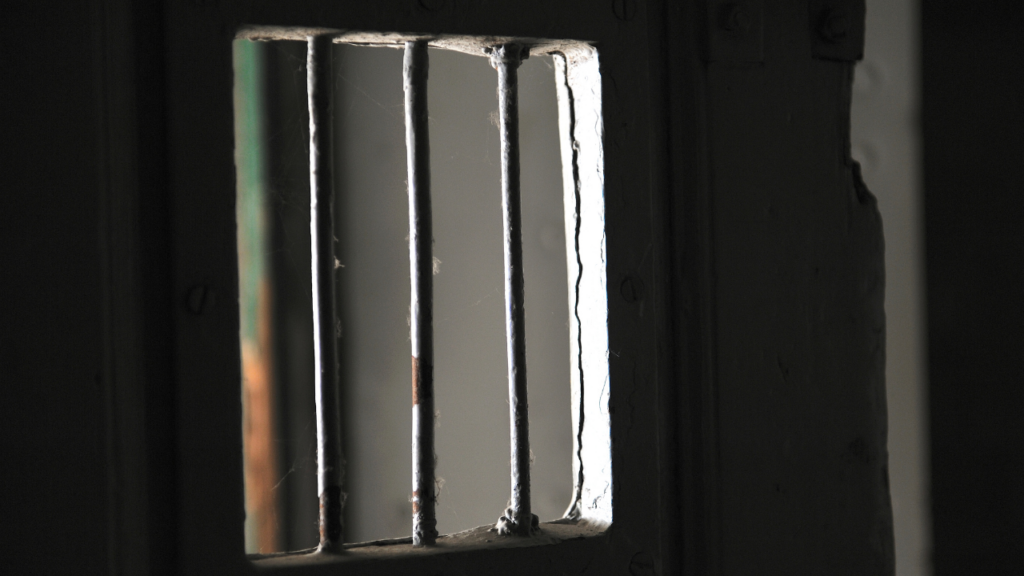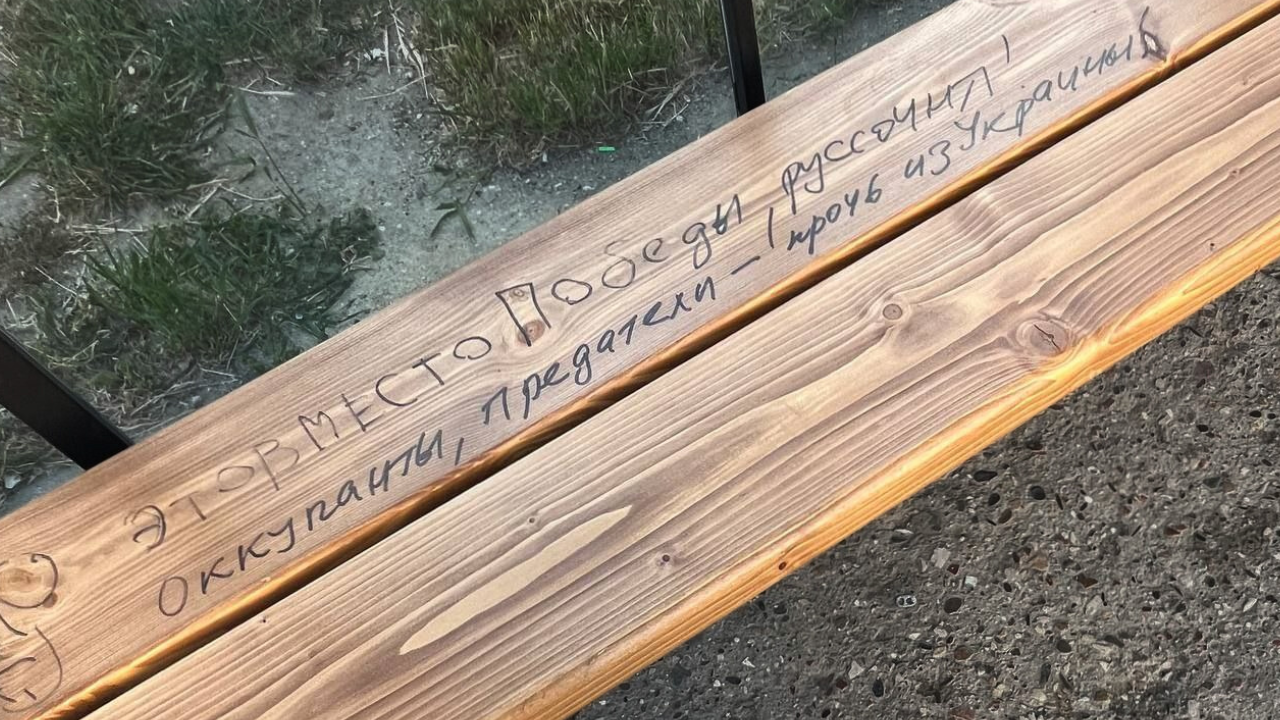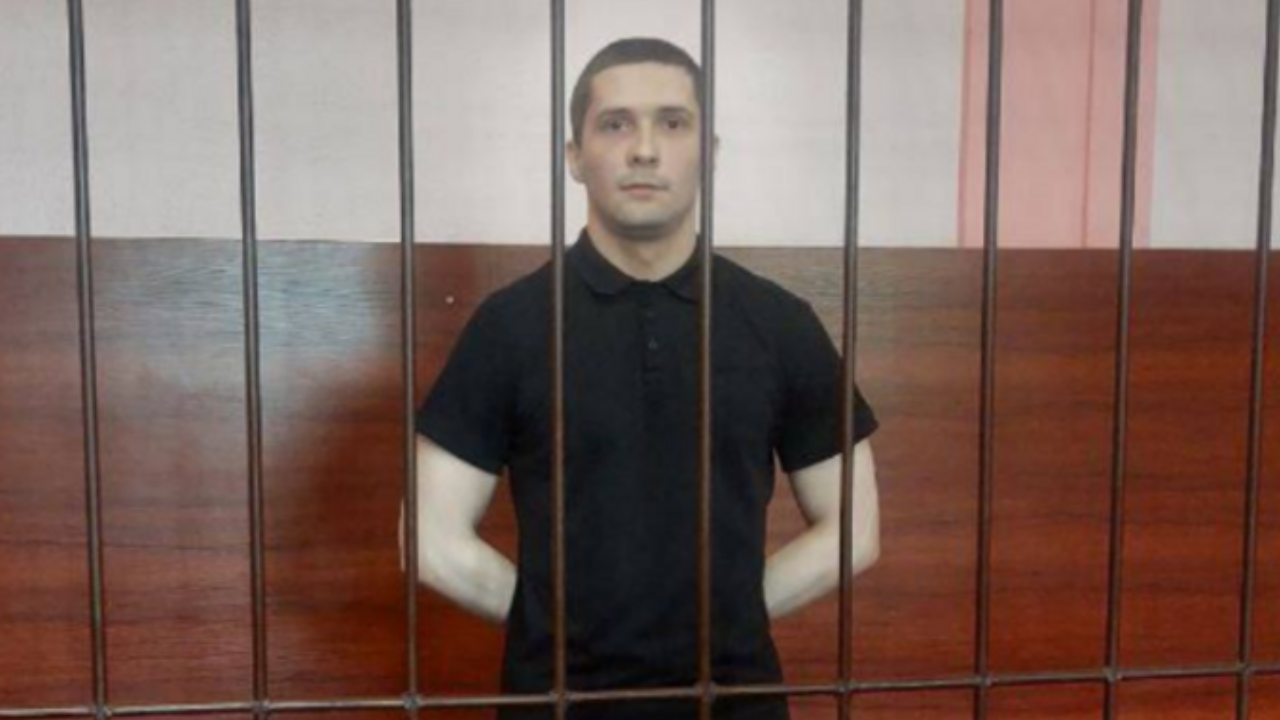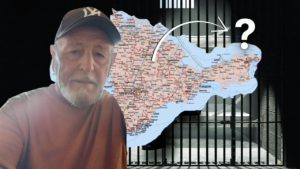In Crimea, the Occupiers Forced a Pensioner from the Luhansk Region to “Repent” for pro-Ukrainian Inscriptions on Benches

Confession in front of the camera, as if during interrogation: in Crimea, 65-year-old Yevhen Nenko from the Luhansk region was publicly forced to “repent” for pro-Ukrainian graffiti. The man is just one example among dozens of Ukrainian civilians the Russian Federation detained or convicted in May under fabricated charges of espionage, extremism, or assisting the Armed Forces of Ukraine. The scale of political repression is growing, and the human stories are becoming increasingly harrowing.
The 65-year-old man sways, shifting from foot to foot, blinking frequently, and stammering as he is forced to explain his “crime” on camera. He identifies himself as Yevhen Nenka from Rubizhne in the Luhansk region, which was occupied by Russia in 2022. The man explains he moved to Crimea because his hometown was destroyed. Now, he is accused of painting pro-Ukrainian and anti-Russian slogans on park and residential benches in Yevpatoria. A 55-second video featuring the Luhansk resident’s “confession” was published by a Crimean Telegram channel known for public denunciations.

One of the benches in Yevpatoria, allegedly painted by Yevhen Nenka
Yevhen Nenka is one of at least 11 Ukrainian civilians detained in the second half of May. It is reported that during this period, 30 Ukrainians were convicted in the occupied territories of Ukraine and Russia: seven civilians and 23 prisoners of war.
In Donetsk, Oskar Jenkins, a volunteer from Australia who was captured by Russians in December 2024, was also sentenced to 13 years in prison.
Most of the convicted prisoners of war were captured in the Kursk region. Vasyl Patlachuk, Petro Voit, Roman Romakin, Serhii Chumasov, Maksym Levchenko, Mykola Shevchenko, Mykola Popovych, Vadym Razghon, Vitalii Solodukha, Dmytro Sankevyсh, Oleksandr Maslinkov, Serhii Palaida, Roman Bara, Yaroslav Zubrytskyi, Oleksii Bolshakov, Arsen Stehar, Mykhailo Shkoda, Andrii Dolhyi, Andrii Pasko, Oleh Zaderei, Serhii Chumasov, and Serhii Shapoval are among them. Like those captured earlier in the Kursk region, all of them were tried as “terrorists” and sentenced to between 14 and 18 years in prison.
One prisoner of war, Oleksandr Verba, was sentenced to 5.5 years in the occupied Luhansk region “for participation in Right Sector.” However, the verdict clearly shows that the man was a soldier of the Ukrainian Armed Forces. Under the occupying prosecutor’s office version, Verba’s “involvement in an extremist organization” was based on the claim that the 67th Mechanized Brigade, where the 46-year-old served, was “formed from members of Right Sector.”
In total, in May, Russians detained at least 22 and convicted at least 15 Ukrainian civilians and 36 prisoners of war.
In occupied Donetsk, Azov fighter Dmytro Kucheriavyi was retried for allegedly shelling a married couple in a village near Mariupol. Previously, the man and nine of his comrades had been sentenced to 22 years in prison for allegedly shelling Mariupol with the intent to kill civilians—even though, according to the Russian “investigation,” no civilians were harmed in either case. The new sentence handed down by the occupiers to Kucheriavyi is 29 years and four months of imprisonment.

Dmytro Kucheriavyi at a hearing of the so-called court
Everything for “Azov”
According to available information, the majority of those detained in the second half of May are residents of the Luhansk region. In addition to Yevhen Nenka, who lived in Yevpatoria, they include unnamed residents of Krasnodon, Kreminna, and the Antratsyt district, as well as a man about whom no details have been provided other than that he allegedly fought with the “Aidar” battalion since May 2014.
The detained man from Kreminna is reported to have been born in 1998. He allegedly provided the Ukrainian party with information about the location of Russian armed forces units. The video released by the FSB shows the young man—whose name is not disclosed and whose face is blurred—stating that he held pro-Ukrainian views and wanted to assist the Armed Forces of Ukraine.
A resident of Krasnodon was detained for allegedly transferring funds to “Azov.” A resident of the Antratsyt district was accused of allegedly manufacturing an explosive device on orders from the Security Service of Ukraine (SBU).
Three people were detained in the Zaporizhzhia region, one each in the Kherson and Donetsk regions. Another person was detained in Crimea: the aforementioned Telegram channel states her name is Olga Drobchuk and that she is 25 years old. The young woman was arrested for posts on social media.
Two residents of Melitopol were also detained for posts on social media. In the Kherson region, a man born in 1977 was arrested for allegedly storing explosives, while a woman in Donetsk was detained for allegedly repeatedly transferring money to “Ukrainian militants.” A 67-year-old woman in Tokmak was also taken into custody for allegedly transferring money to Azov.
Multiple Verdicts
Among the seven convicted civilians, three are residents of Crimea—from Dzhankoi, Sevastopol, and Simeiz. One of them, a 59-year-old man whose name was not disclosed, received a 20-year prison sentence for allegedly sharing the locations of Russian military warehouses with the Security Service of Ukraine (SBU). Serhii Bikbaiev from Sevastopol was sentenced to 18 years for allegedly transporting explosive devices on the SBU’s orders. Dmytro Adamionok, a resident of Simeiz, was given a 12-year sentence for allegedly attempting to join the Russian Volunteer Corps.
The other two convicted individuals are 52-year-old Svitlana Shevchuk from Hola Prystan and a 35-year-old unnamed man from Skadovsk. The man received a two-year suspended sentence for social media posts. The woman was sentenced to 12 years in prison for allegedly sharing information about the deployment of Russian troops and military equipment.
Stanislav Udoviki, a resident of Luhansk, was sentenced to 17 years in prison also for allegedly sharing information with Ukrainian military intelligence. Serhii Shtyrov from Yenakiieve in the Donetsk region was sentenced to 13 years for allegedly transferring money to the Armed Forces of Ukraine. Udoviki is 21, while Shtyrov is 60 years old. The independent Russian outlet Mediazona noted that the entire trial of the Donetsk resident lasted just over a week.
За останній місяць Росія затримала щонайменше 15 і засудила 39 цивільних українців
In addition, the Sevastopol Court of Appeals upheld the sentence of 58-year-old Oksana Senedzhuk, who had been sentenced to 15 years in prison for allegedly providing Ukrainian military intelligence with information about Russian Black Sea Fleet facilities in the city. Senedzhuk had participated in the revolutionary events of 2005 and 2014 in Ukraine and was known for her pro-Ukrainian stance.
For unclear reasons, Russia’s FSB also boasted about the verdict handed down in April to Ukrainian Oleh Zabolotnyi and Russian citizen Maksym Volha, which was immediately reported by the Russian prosecutor’s office. Zabolotnyi was allegedly tasked with assassinating a high-ranking military officer in Voronezh, and Volha was reported to have allegedly supplied him with the explosives for the operation.
Another high-profile court case did not involve imprisonment. In Berdiansk, the occupation court granted custody of two children, born in 2008 and 2009, to their grandmother because the occupiers had banned their mother from entering “Russian territory.” This marks at least the second known instance of custody being transferred to older relatives after children were separated from their parents. In March, also in the occupied part of the Zaporizhzhia region, an illegal court deprived a couple living in the Czech Republic of their parental rights. It appointed the child’s grandfather as guardian.
This publication has been produced with the support of the European Endowment for Democracy (EED). Its contents do not necessarily reflect the official opinion of EED. Responsibility for the information and views expressed in this publication lies entirely with the author(s).







